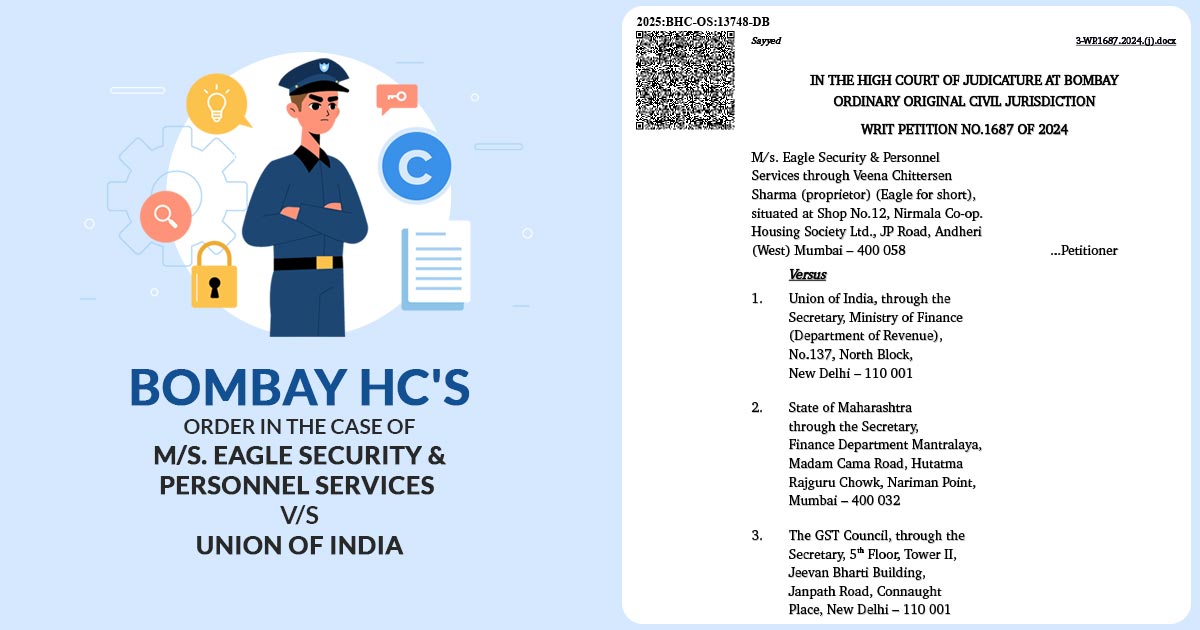
The Bombay High Court has ruled that notifications related to the Reverse Charge Mechanism (RCM) that deny Input Tax Credit (ITC) to service providers are legally acceptable.
The court stated that these decisions do not violate the rights guaranteed by articles 14 and 19(1)(g) of the Constitution, which are designed to ensure equality and the right to practice any profession.
As per the bench in the case of RCM, the person getting the services, that is, the receiver, files the tax and could claim the credit for the same. The service provider is waived from filing the taxes. Just due to the persons covered via RCM could not claim the ITC credit could not be seen in a microscopic way to hold the notification and the provision as ultra vires.
Justices M.S. Sonak and Jitendra Jain were addressing the matter where the taxpayer filed a writ quashing and setting aside sub-section 17(2) of the CGST Act and MGST Act rolled out vide the Impugned Notifications, to the extent it negates the benefit of ITC claim to the applicant for being ultra vires of the CGST Act, MGST Act, and Rules made thereunder and the Constitution.
From the GST RCM, the taxpayer was not satisfied, as input tax was filed on the goods and services procured by her for rendering the security services, now could not be set off against the output tax obligation, as such services under the RCM are considered as exempted services in the taxpayer’s hands and therefore no output tax obligation was there against which the ITC could get set-off, which consequence in the increase in the cost of rendering services.
As per the taxpayer, for the impugned provisions and the issued notifications, the taxpayer is not able to finish, as the taxpayer is not qualified to take the ITC, which results in a surge in the cost of rendering service. Thus, under Article 19(1)(g) of the Constitution of India, the right of the taxpayer to perform the business is a breach.
After looking into Sections 2, 9, 16, 17, and 49 of the CGST Act the bench said that the person whose services are charged to tax under RCM is not obligated to file any tax and these services are considered as exempted u/s 17 and also being no output tax obligation on the person, the ITC is not allowable.
As per the bench, the ITC credit advantage is available when there is an output tax obligation. In RCM, there is no output tax liability as it is considered exempt, and thus, in tune with the purpose of GST, the ITC credit could not be claimed in the absence of the liability, though it could be claimed via the receiver of the service.
Read Also: Bombay High Court Upholds Manual Revision of Pre-GST Returns, Affirms Tax Credit Entitlement
A provision of law could not get struck down or read down to make a business competitive for a specific sort of entity. On the touchstone of the Constitution of India, the provisions of law are required to be tested, and not on the touchstone of competitiveness in the business environment.
The freedom to perform the business or profession is allowed under Article 19(1)(g) and not the competitiveness of a business entity in the market, the bench cited.
Considerably, it is not the matter of the taxpayer that by virtue of the impugned notification/provision, there is a bar on him to operate his business. Thus, even in this case, there is no cause for reading down or quashing the impugned provisions contested in the writ petition or for it being breached of Article 19(1)(g) of the Constitution of India, the bench expressed.
The bench in the above-said view has dismissed the petition.
| Case Title | M/s. Eagle Security & Personnel Services vs. Union of India |
| Case No. | No. 1687 of 2024 |
| For the Petitioner by | Mr. Shreyas Shrivastava |
| For the Represented by | Mr. Saurabh R. Mashelkar |
| Bombay High Court | Read Order |